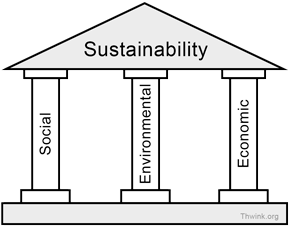Social Sustainability
![]() The general definition of social sustainability is the ability of a social system, such as a country, to function at a defined level of social well being indefinitely. That level should be defined in relation to the goal of Homo sapiens, which is (or should be) to optimize quality of life for those living and their descendents.
The general definition of social sustainability is the ability of a social system, such as a country, to function at a defined level of social well being indefinitely. That level should be defined in relation to the goal of Homo sapiens, which is (or should be) to optimize quality of life for those living and their descendents.
After that there is universal disagreement on what quality of life goals should be. Not only do nations disagree. So do their political parties, their religions, their cultures, their classes, their activists organizations, and so on.
Therefore we will not attempt to define what quality of life goals should be, even in the broadest sense. This means that social sustainability on a practical, implementable basis is undefined. Thus it's the weakest pillar of them all because people can't even agree on which way is up. This is a shame, because a strong social pillar is the topmost goal of democratic systems.
A possible direction for agreement on what the tangible goals of social sustainability should be is may be found in Bhutan's national goal of optimizing gross national happiness.
The clip art of tiny people in the social sustainability icon is from Clip Art Mountain.



























